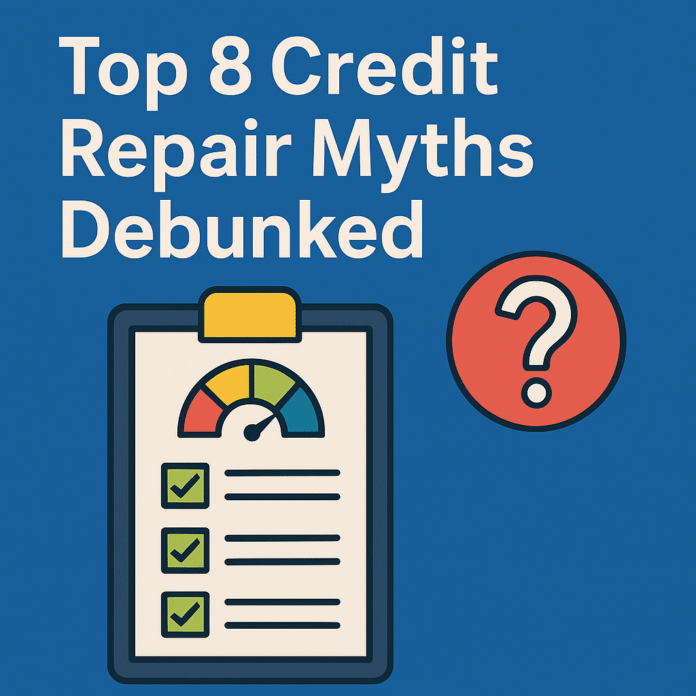Keeping a good credit score is important for getting good interest rates on mortgages, auto loans, and credit cards, as well as for improving your chances of getting a job or renting an apartment. But there are a lot of myths about credit repair that take advantage of people’s confusion and often lead them to buy services that are expensive and not needed. In this complete guide, we bust the eight most common credit repair myths, giving you the tools and information you need to improve your own credit health.
This article follows EEAT (Experience, Expertise, Authority, Trustworthiness) guidelines and uses information from reliable sources like the Consumer Financial Protection Bureau (CFPB), the Federal Trade Commission (FTC), Experian, and Investopedia, as well as federal laws like the Fair Credit Reporting Act (FCRA). We want to do more than just correct false information; we also want to give you clear, actionable steps—at no extra cost—to dispute mistakes, learn about credit scoring models, and develop good credit habits that will last.
This article has expert advice, frequently asked questions, and real-life examples for people who are just starting to build their credit or who want to get back on track after a setback. Let’s get started by putting an end to these widespread falsehoods once and for all.
Myth #1: Credit Repair Companies Can Take Away Bad Information That Is Correct
Many credit repair companies say they can “erase” real negative entries, like late payments, charge-offs, or bankruptcies, that have been reported correctly. This is absolutely not true. The FCRA says that credit reporting agencies must keep correct information and can’t delete valid entries until the legal time limits run out (seven years for most negatives and up to ten years for bankruptcies). Consumer Financial Protection Bureau.
If you try to dispute correct entries, they may be hidden for a short time while an investigation is going on. However, once they are confirmed, they are put back in. You can only have information permanently removed if it is clearly wrong, missing, or not verified. The Consumer Financial Protection Bureau says that credit bureaus can only change or remove things that you can prove are wrong, and they can’t charge you for it.
Tip:
- You can get your free yearly credit reports from AnnualCreditReport.com.
- Find mistakes, like wrong balances, dates, or accounts.
- You can file disputes directly with Experian, Equifax, and TransUnion through their websites or by certified mail.
- Following federal rules, DIY dispute processes save you a lot of money that dishonest credit repair companies often charge.
Myth #2: Looking at your credit report will lower your score.
Many people are afraid that getting their own credit report will hurt their credit score. These are actually “soft inquiries,” which means they don’t affect your credit scores at all. Consumer Financial Protection Bureau. Only “hard inquiries,” which happen when a lender or creditor checks your credit after you apply for something, can lower your score by a few points. Even then, the effect is small and short-lived.
One of the most important things you can do to manage your credit is to check your credit reports often. It helps you find identity theft, fix mistakes, and learn about things that can affect your score. The FACT Act, which changed the FCRA, gives you more power by letting you access your information for free once a year and sending you fraud alerts to lower the risk of identity theft.
Tip that you can use:
- Set up reminders every three months to download and read your reports.
- If you see fraud or accounts you don’t recognize, put a fraud alert or security freeze right away.
Myth #3: Credit Repair Works Right Away
Credit repair takes time; it is never a quick fix. Changes to your credit report and score take time to show up, whether you dispute mistakes or slowly change how you pay your bills. It can take up to 30 days for a dispute to be resolved, and even after that, credit scoring algorithms like FICO® or VantageScore® may only update once a month. Take Charge America.
Also, true credit health comes from having good financial habits all the time, like paying your bills on time, using your credit wisely, and having a variety of account types. Predatory companies that charge upfront fees for small, short-term improvements often take advantage of impatient customers who want a “magic bullet.”
Tip that you can use:
- Keep an eye on your credit utilization ratio, which should be less than 30%.
- Set up autopay for all of your bills so you never miss a payment.
- Use free tools like Credit Karma and Experian Boost to keep an eye on your progress in real time.
Myth #4: Credit repair companies can promise that your score will go up by a certain amount.
No one has the right to promise you a certain number of points on your credit score. If someone promises a specific improvement, like “Raise your FICO score by 100 points in 60 days!” it’s a sign of dishonest marketing. Take Charge America and Experian. Credit scores are unique results of scoring models that are affected by many things that third-party services can’t control.
Real credit professionals can list possible actions (like fixing mistakes or making the most of your credit), along with the usual ranges of their effects, but they can’t guarantee exact results. The CFPB has fined and settled with companies that make these false promises. This shows that these claims break the Credit Repair Organizations Act (CROA).
Tip that you can use:
- Check service contracts carefully: any promise of results is against federal law.
- Find a non-profit credit counseling agency that is approved by the National Foundation for Credit Counseling (NFCC) to get free or low-cost help without any false promises.
Myth #5: You Can’t Fix Your Credit You
You can fix your credit on your own, and it’s free. Federal law spells out all rights and procedures. You have full control over whether you dispute errors, negotiate with creditors, or keep up with your payments:
- Dispute mistakes with credit bureaus and furnishers.
- Talk to your creditors about “goodwill adjustments” that will get rid of small debts after you pay them.
- Settle medical debts for less and ask for them to be removed after you pay.
Investopedia says that companies offer convenience, but they don’t do anything that consumers can’t do themselves for free.
Tip you can use:
- Use the FTC and CFPB’s template letters for requests for goodwill and disputes.
- Keep all of your correspondence and proof of payment in order.
Myth #6: Paying off collections right away makes your score better.
Settling a collection is good, but it doesn’t mean that your score will go up right away. Some scoring models still put a lot of weight on paid collections, while others, like newer versions of FICO, don’t even look at paid medical collections at all, but only after they have been “paid” for at least a year. R23 Law | Lawyers Who Protect Consumers
You can only get a collection removed from your report if it was reported by mistake or if you negotiate with the creditor in a certain way. Paying off a collection does stop more damage (like entries for late payments), but the first bad mark can stay.
Tip that you can use:
- Make “pay-for-delete” agreements a priority: get a written promise from the collector that they will remove the entry when you pay.
- Or, you could focus on getting rid of collections by keeping up good activity on other accounts.
Myth #7: It’s easy to get rid of bankruptcy
From the date of filing, bankruptcy filings stay on your credit report for the full legal period: seven years for Chapter 13 and ten years for Chapter 7. Experian Consumer Financial Protection Bureau says that no creditor, creditor’s lawyer, or credit repair company can legally remove a valid bankruptcy before it is due.
Bankruptcy can be a fresh start for some people, even though it can be very scary. After bankruptcy, rebuilding your credit can go faster if you use secured cards, credit-builder loans, and make payments on time every month.
Tip you can use:
- Get a secured credit card with a deposit that you can get back. Use it sparingly.
- Think about getting a credit-builder loan from a credit union that reports to all three bureaus.
Myth #8: You Only Have One Score on Your Credit Report
There is no one credit score that everyone can use. You have scores from different bureaus (Experian, Equifax, TransUnion) and models (FICO, VantageScore), so every time you check, they are a little different.
Knowing this small difference will help you not get confused when you see different numbers. Instead of focusing on exact values, like “good” FICO scores between 670 and 739, think about ranges.
Tip that you can use:
- Instead of looking at absolute numbers, look at trends. A rising trend means things are getting better.
- Check out free credit monitoring services to see how your scores change over time.
Questions that people often ask (FAQs)
1. How often should I look at my credit report? Try to do reviews every three months. Spread out your three free annual reports from AnnualCreditReport.com over the course of the year to keep an eye on changes and find mistakes quickly.
2. Will closing old accounts improve my credit? Not most of the time. Closing accounts can make your credit history shorter and your utilization ratio higher. Keep accounts that aren’t being used open unless you have a good reason to close them.
3. Is there anything a paid credit repair service can do that I can’t? No, you can do everything they do for free under federal law. According to CROA rules, you shouldn’t pay upfront fees and you shouldn’t pay until the services are done.
4. How long does it take for credit to get better? It can take 30 to 45 days for small changes, like paying off debts, to show up. It could take 30 to 60 days to settle disputes and make goodwill adjustments. To rebuild a significant score, you usually need to stick to good habits for 6 to 12 months.
5. What does it mean to send a “goodwill” letter? A goodwill letter is a personal request to a creditor to take a late payment off your report as a sign of goodwill, usually after you’ve been paying on time for a few months.
6. Are requests for auto loans or mortgages grouped together? Yes. FICO and VantageScore count multiple requests for the same type of loan made within 14 to 45 days as one request, which has less of an effect on your score.
7. Can stealing my identity hurt my credit? Of course. Not paying your bills on time and having accounts that aren’t yours hurt your score. Put fraud alerts or credit freezes in place right away, and fight any false items.
8. Do credit counseling companies fix my report? No, they can help you learn, make a budget, and manage your debt, but they can’t directly delete accurate items. Find nonprofits that have been approved by the NFCC to get free help.
In conclusion
It can be hard to figure out how to fix your credit, especially when there are so many false claims out there. But if you know your federal rights under FCRA, FACTA, and CROA, and use free, do-it-yourself methods, you can confidently dispute mistakes, improve your credit habits, and raise your score without paying for empty promises.
Keep in mind:
- Accuracy is important: you can only get rid of wrong information.
- Consistency is important: Making payments on time and using less of a service will lead to long-term improvement.
- Be careful: Check reports for mistakes and fraud on a regular basis.
With these tips and information, you can take charge of your credit health without needing a middleman.
References
- Experian. “How to Remove Bankruptcy From Your Credit Report.” Experian Blog, March 12, 2024. https://www.experian.com/blogs/ask-experian/removing-bankruptcy-from-your-credit-report/
- Consumer Financial Protection Bureau. “How long does a bankruptcy appear on credit reports?” December 18, 2024. https://www.consumerfinance.gov/ask-cfpb/how-long-does-a-bankruptcy-appear-on-my-credit-reports-en-325/
- Consumer Financial Protection Bureau. “Credit Score Myths That Might Be Holding You Back.” January 15, 2019. https://www.consumerfinance.gov/about-us/blog/credit-score-myths-might-be-holding-you-back-improving-your-credit/
- Federal Trade Commission. “Don’t Be Misled by Companies Offering Paid Credit Repair.” CFPB Consumer Advisory PDF. https://files.consumerfinance.gov/f/documents/092016_cfpb_ConsumerAdvisory.pdf
- Take Charge America. “Busting the Myths About Credit Repair.” https://www.takechargeamerica.org/busting-the-myths-about-credit-repair/
- R23 Law. “KEEPING IT REAL – Common Myths About Credit Repair.” August 20, 2024. https://www.r23law.com/articles/credit-repair-myths
- Investopedia. “Is Credit Repair Illegal?” November 15, 2020. https://www.investopedia.com/is-credit-repair-illegal-5075120
- Fair Credit Reporting Act. Wikipedia. https://en.wikipedia.org/wiki/Fair_Credit_Reporting_Act






